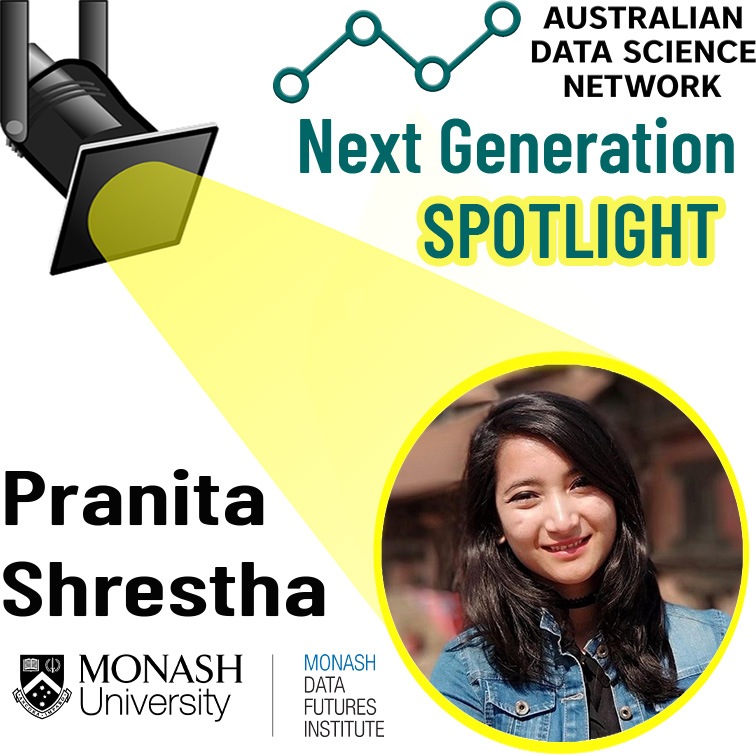“Next Gen” Spotlight: Pranita Shrestha
Tell us a bit about yourself
Namastey!! My name is Pranita Shrestha and I am from Nepal. I am currently pursuing a PhD in Information Technology at Monash University. I am a passionate feminist, and human-centred computing (HCC), data science and digital health enthusiast. I am interested in exploring the avenues for interdisciplinary approaches in mental health research. I firmly believe in designing and developing technical solutions with, rather than for, stakeholders, and leveraging technology for social good. My aim is to make a real-world impact in digital health and encourage more women to join the field of computing science.
What is your PhD in and how did you choose this project?
My doctoral research delves into the theme of "One Size (Doesn't) Fit All: Leveraging generative AI approaches to enhance social media interventions for body dissatisfaction." It revolves around the prevention of eating disorders, a significant mental health concern affecting nearly 1 million Australians. These disorders manifest as unhealthy fixations on eating, exercise, or body shape. Social media algorithms often propagate detrimental and unattainable beauty ideals and body standards, fostering the development of body dissatisfaction and eating disorders. Such content perpetuates the internalization of unrealistic body standards and reinforces societal biases. My study aims to investigate how we can train generative AI to discern and categorise social media content, leveraging it to develop digital interventions for body dissatisfaction.
As someone, who had experienced severe body dissatisfaction as growing up, this topic is close to my heart. Witnessing my close cousins and friends develop disordered eating behaviours due to body image issues, particularly amplified by social media, has deepened my resolve to make a difference in this domain.
Any surprises or highlights from your PhD journey?
Given that my PhD research delves into interdisciplinary realms, I encountered some initial challenges in navigating the complex landscape of mental health. As a computer scientist, my mindset typically gravitates towards binary thinking (0 or 1), where outcomes are often perceived as either one thing or another. However, human aspects seldom adhere to such binary logic; they reside within nuanced gray areas between 0 and 1, comprising multiple layers of complexity. Adapting to this paradigm shift required a process of unlearning and relearning new concepts and perspectives.
In my previous work, I primarily interacted with pre-built datasets and systems. However, embarking on my PhD journey I had to actively engage in and facilitate numerous co-design processes involving diverse stakeholders (people at risk factor of body dissatisfaction, lived experience of eating disorders, service provider of eating disorders and body image researchers). This experience proved both challenging and exhilarating as I learned to navigate these processes collaboratively with stakeholders, fostering a deeper understanding of their requirements and needs.
How did you get interested in Data Science?
Since childhood, computers have fascinated me. Following my undergraduate studies, I delved into software development, where my interest in data science started to increase. What captivated me was the ability to unravel narratives and identify hidden insights within data. Motivated by this fascination, I decided to conduct my Master thesis in this field.
My thesis, titled "Curiosity-inspired Personalised Recommendation," bridged the realms of psychology and recommender systems to strike a balance between accuracy and novelty trade-offs. Drawing upon two psychological theories on curiosity, I improved a model for recommender systems. Throughout this journey, I realised I was interested in building my career in data science but driven by human-centric perspective.
What do you see as the big challenge facing the ADSN and the entire Data Science Community? Is there a big research question we should be tackling?
The major challenge facing the ADSN and the entire Data Science Community is the need to incorporate a human perspective into the data science realm. While data-driven approaches have revolutionised various fields, there's a growing recognition that they must align with human values, ethics, and societal impacts. These solutions also need to incorporate human needs, requirements, and values. We should not only focus on optimising algorithms and predictive models, but we also need to prioritise human well-being and societal benefits. Aside from this, there is a need to explore the ethical implications of data collection, usage and dissemination.
Fun fact about yourself...
Currently, I am learning Kathak, an Indian classical dance. I enjoy sketching, reading, and watching Chinese and Korean dramas. I was chosen as one of the Google Women TechMakers Scholar in 2018 and received the Monash Institute of Mechanical Engineering (MIME) Women in STEMM Student Leader Award in 2024. I joined Women LEAD Nepal as a fellow in their Young Women's Political Leadership (YWPLI) program and served as Project Lead for their "Youth For Youth: Allies for Feminist Leadership" initiative. Our goal for the initiative was to instil allyship for gender equality among children, challenging traditional stereotypes and norms through educational programs. Also, I am a terrible singer.
VIDEO: Pranita shares her Data Science journey story at the ADSN's Rising Stars in Data Science event
